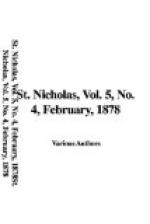* * * * *
Geneva, N.Y.
DEAR ST. NICHOLAS: Please tell “Jack” that apples that are part sour and part sweet grow in the beautiful State of New York. I have tasted of such fruit and am sure it is so. Who can tell me more about this wonderful fruit? And how many have ever eaten such apples?
Can any one tell me what causes
them to grow one side sweet, and
the other sour? Hoping
to hear more on this subject, I remain,
yours truly,
ALMA AYLESWORTH.
* * * * *
Mobile, Ala.
DEAR ST. NICHOLAS: I wish to tell you of Fanny, our little mule, who cannot be forced to work on Sunday. She is gentle, obedient and faithful on week days, but on Sunday Fanny will not be made to move.
Don’t think us heathen, dear ST. NICHOLAS, for the boys just tried to make her carry a load of hay as a test, and to tease her, also; but when papa saw what they were up to, he put a stop to it, and now Fanny enjoys her Sundays in peace. My little sister says, “she is a religious mule.” Do you think that the mule really knows when Sunday has come?—Your well-wisher,
ERNESTINE HAMMOND.
* * * * *
KING ALFRED AND THE CAKES.
(Jack-in-the-Pulpit’s Story in the December Number, Straightened Out.)
King Alfred the Great, having been driven by the Danes to seek safety in flight, disguised himself as a peasant, and took refuge in the hut of a cow-herd, where he was told to watch the baking of some cakes. But he forgot the cakes and let them burn; and when the herdsman’s wife came in, she gave him a sound scolding for his carelessness.
Charles I. of England was defeated at Marston Moor; and his son, Charles II., after losing the battle of Worcester, barely escaped capture, by hiding in the leafy branches of an oak-tree.
Robert Bruce lost many battles, fighting for the Scottish throne. At length, he lay down disheartened on a heap of straw in an old hut. While he was thinking over his troubles, he saw a spider trying to get from one rafter to another. It failed many times, but at last succeeded, and Bruce, taking courage at the insect’s example, went on fighting until he had secured his kingdom.
Sir Isaac Newton had on his table a pile of papers upon which were written calculations that had taken him twenty years to make. One evening, he left the room for a few minutes, and when he came back he found that his little dog “Diamond” had overturned a candle and set fire to the precious papers, of which nothing was left but a heap of ashes. It was then that he cried, “Oh, Diamond! Diamond! thou little knowest what mischief thou hast done!”
It is said that George Washington, when a boy, destroyed his father’s favorite cherry-tree, and, being asked about it, replied: “I cannot tell a lie; I did it with my little hatchet.”




